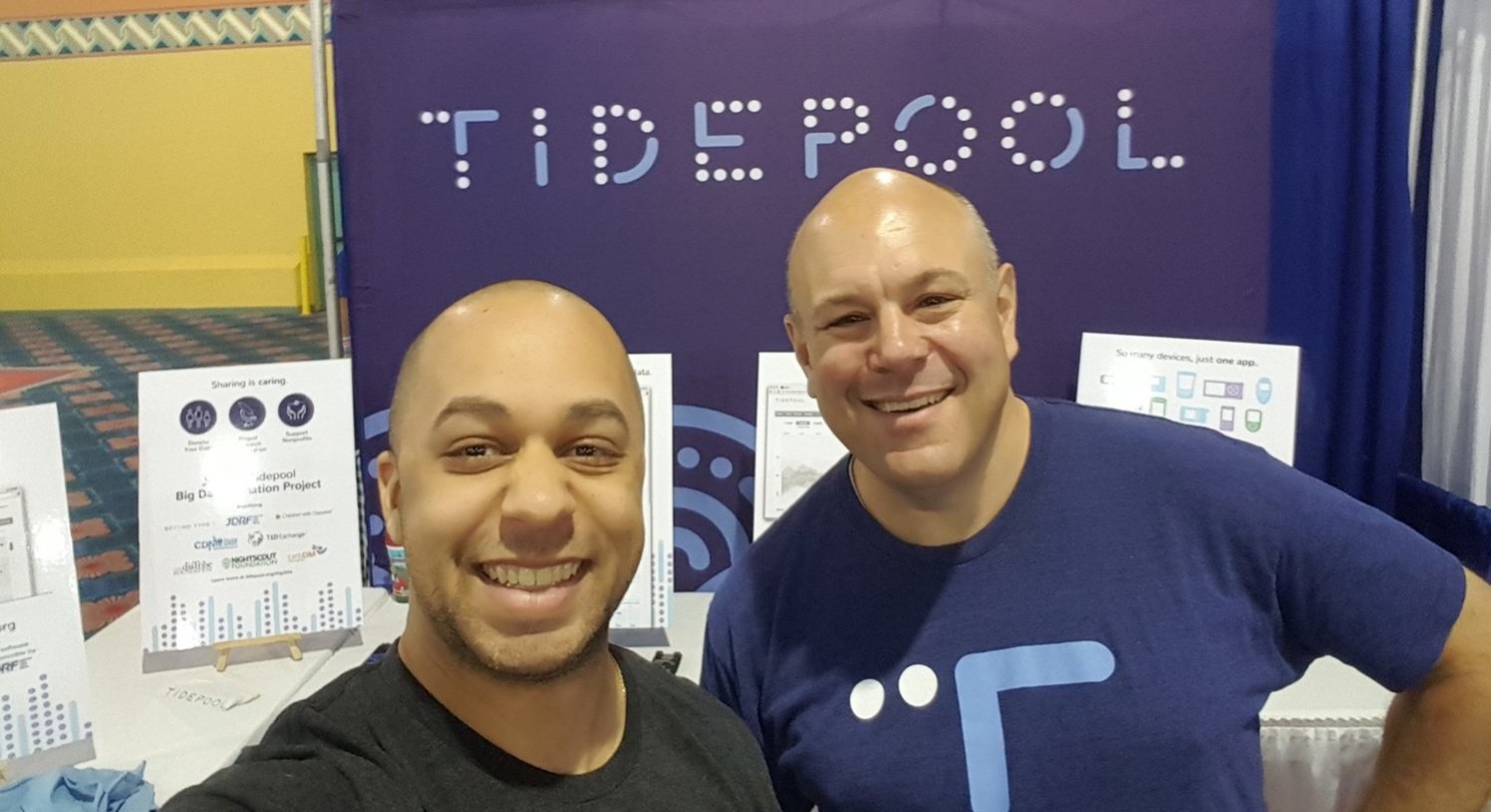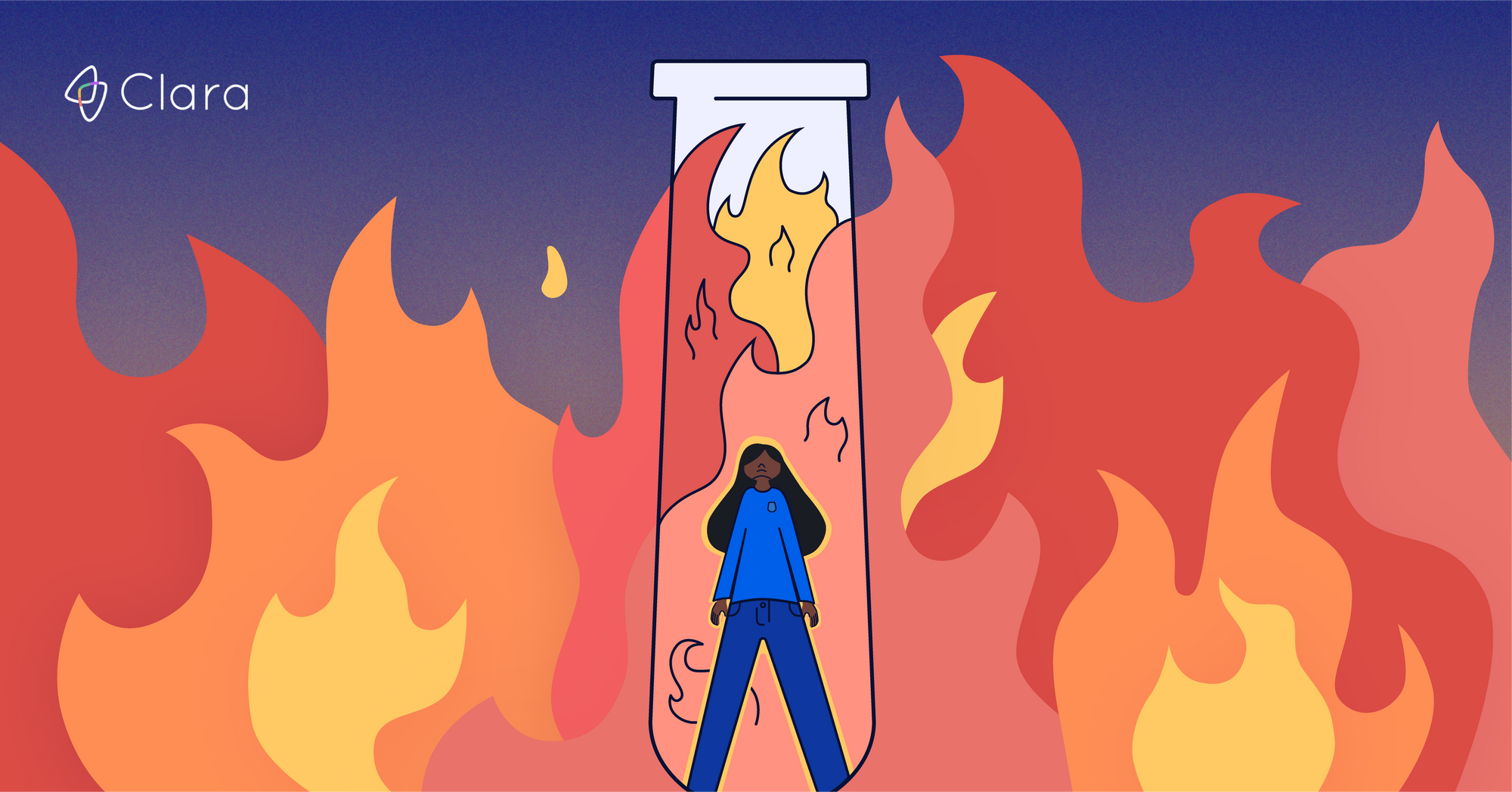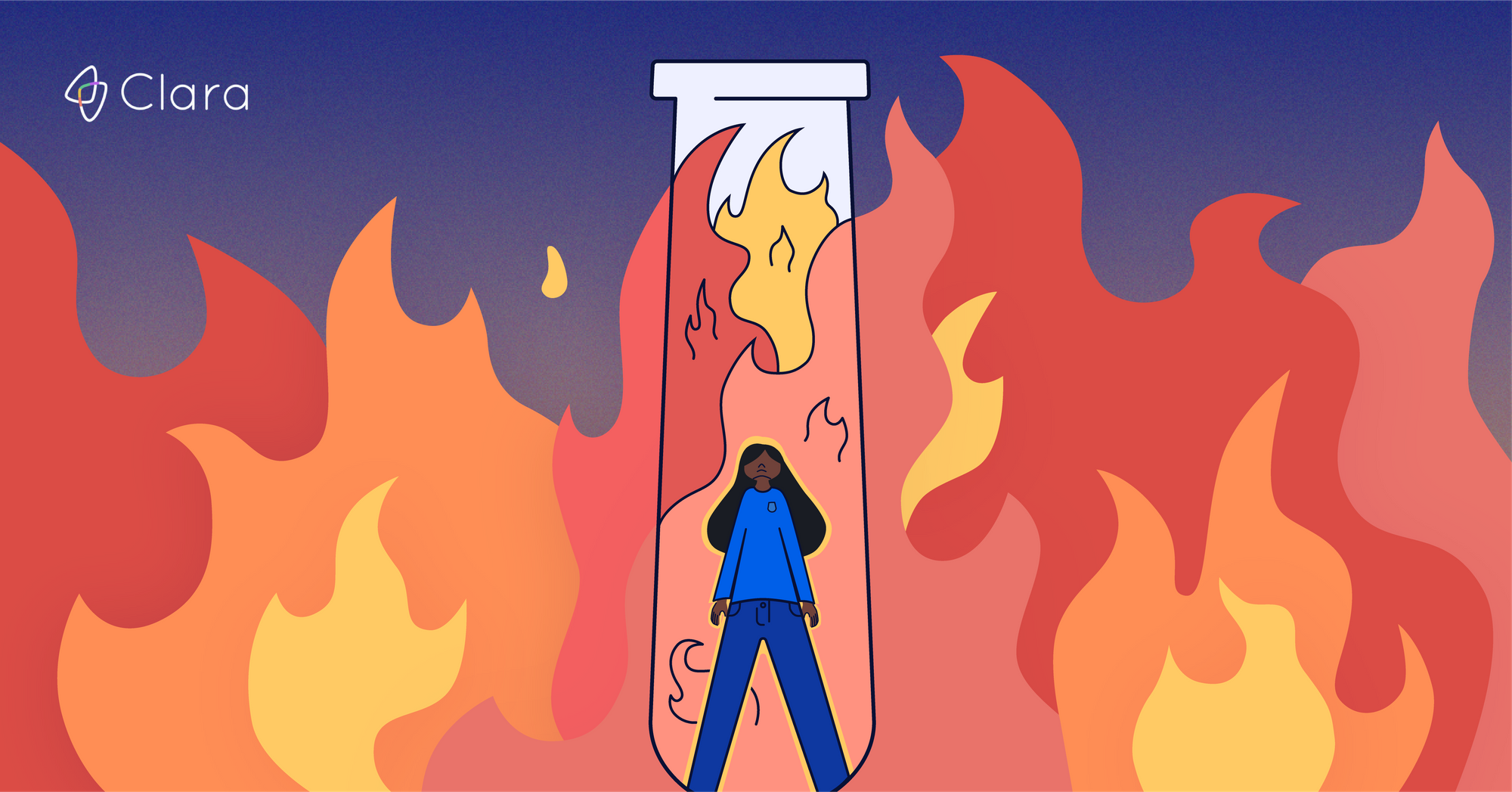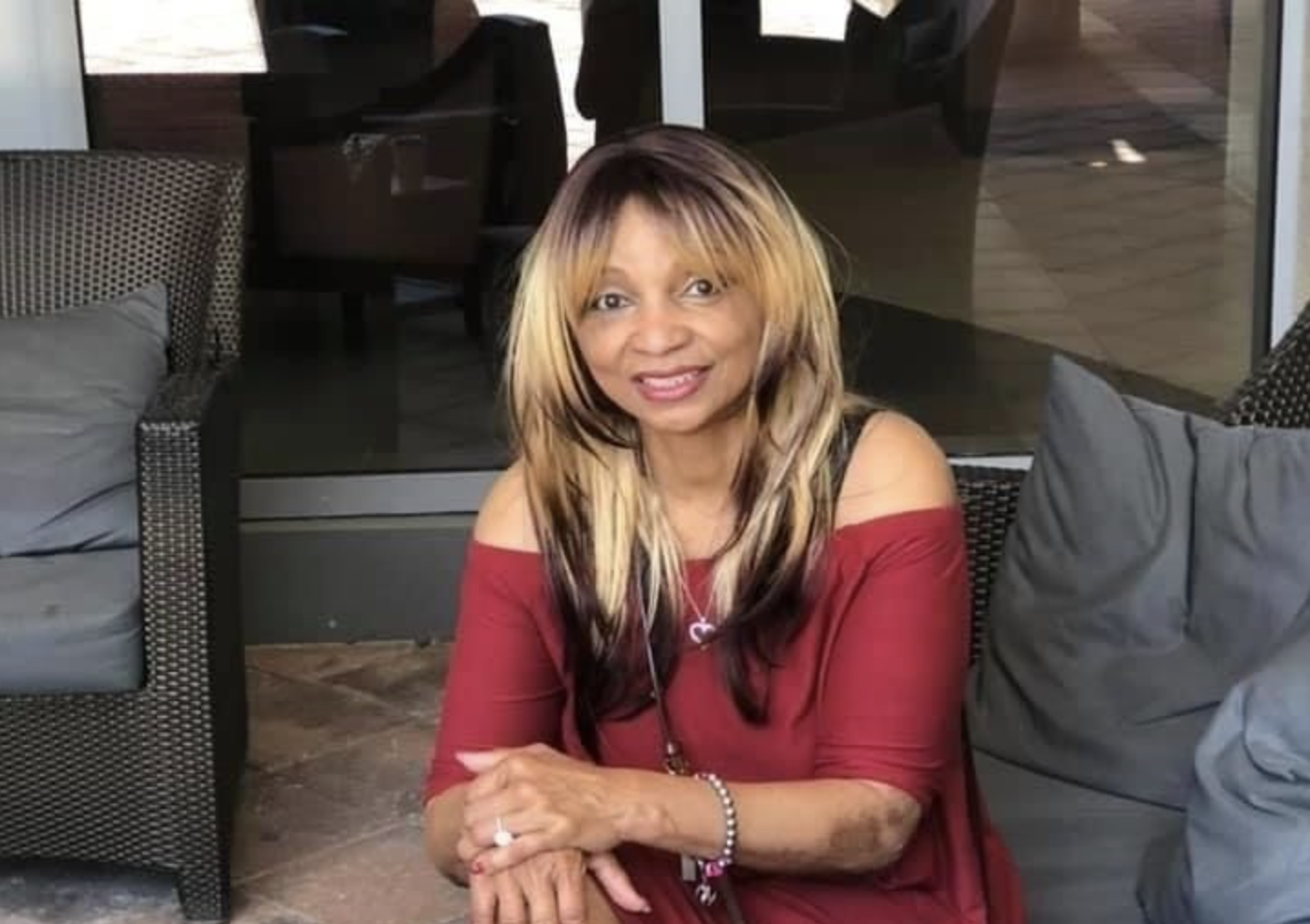Our latest Patients Have Power episode is with Chris Snider from Tidepool.org. (You can subscribe to the podcast at Apple Podcasts, or listen to it with the media player above).
In this episode, we speak with Chris Snider, a self-described "accidental advocate" who, despite living with chronic conditions that often zap him of energy, still takes a before-dawn train from his home in New York City to DC to fight for healthcare access for all Americans... before taking the 7PM train back, after a day packed with meetings.
Below is a transcript of the episode for your reading pleasure!
Aaron Jun: Hello, everyone. Welcome back to the Patients Have Power Podcast. This is your co-host, Aaron, and I know it's been a while. So I hope you've been well, and I hope your summer was sunny, warm, and fun.
We've been gone for a little bit 'cause we're gearing up for Season Two, and in Season Two, we're going to continue to tell the stories of patients who move us, motivate us, and inspire us, but we're also gonna be expanding the conversation to include folks from healthcare and health-tech, as well, to see how they're taking inspiration and turning it into action that can, one day, change the world.
So, this is Season Two, expanding the conversation. Thank you so much for tuning in and we will catch you on a weekly basis from now on.
Lilly Stairs: Hello, everyone, and welcome to the Patients Have Power Podcast. I'm super pumped because today, we have Christopher Snider with us, and Chris is ... I don't even know where to start because he does so many different things. I'm not really sure when he sleeps. He didn't get much sleep last night, I've been told, because he has a new puppy. So, Chris, welcome to the show. We're so happy to have you on.
Chris Snider: Thank you for having me. By the way, your shirts are really, really soft. So shout out to you and Clara Health for a very quality tee shirt selection, there.
Lilly Stairs: Nice. Well, we did specifically pick shirts that were really soft so that people would be happy with them and actually wanna wear them and not just wear them once and throw them in the trash.
Chris Snider: It definitely worked on me. So nice work on that.
Lilly Stairs: Excellent. Excellent. So Chris ... as I said, he has his hands in a lot of different places. I would say, primarily, he is a diabetes advocate, and he has spent a lot of time in the patient advocacy space, and he even works in that professionally at Tidepool, and so, today, we're gonna have the opportunity to talk to him about that.
Lilly Stairs: Chris, I'd like to just get started by having you give us that five-minute, high-level overview of your experience as a patient and an advocate. I know that you could probably fill hours on end talking about it, but if you could just give us that high-level, just so that we can bring our audience up to speed.
Chris Snider: Sure. So I was diagnosed with Type One Diabetes in 2002. This was my freshman year of college. I went to Virginia Tech, so I equated the symptoms of frequent urination and weight loss as stress when I was trying to get into the Engineering Program at Virginia Tech, and I went back home one weekend, and my parents said,
"You look like crap. Go to the doctor," and the doctor said, "You look like crap. Pee in this cup." Then two hours later it was, "Hey, you've got a diabetes diagnosis." So that was 2002.
Chris Snider: I, pretty much, coasted on a very rigid routine for about seven years. It was about the end of 2008 when I actually discovered that there were other people with diabetes out in the world. That was thanks to Twitter, and, eventually, patient blogs. I was at a point in my life that I was angry, sort of, with everything, but especially with my diabetes. That's when ... January 2009 is when I started my own patient vlog talking about my diabetes experience, and those early months were very, very angry. There was a lot of emotion that I had to, sort of, wrap my head around. Then, eventually, once I got through the anger part, then life, sort of, settled down. Coincidentally, is when I met my now wife later that year. So, as life improved, diabetes, sort of, improved at the same time.
Chris Snider: Over the course of my patient advocacy journey, I connected with people with diabetes across the world. A number of them are still my friends today. Some of 'em came to my wedding. We are a very close-knit group of very enthusiastic patient advocates who happen to have diabetes but also we've seen these people talk about their struggles trying to get pregnant and now they have two kids. All these other ... just watching these families grow, watching people move from place to place, job to job, it's really incredible to see what sort of connections can come out of that.
Chris Snider: From my diabetes experience came ... It's a weird, round-about story, but every Friday when first had my patient blog, I would write about video games because I was an enthusiastic gamer ... still am, technically, but I don't game as much. That's a whole other podcast, but from those video-game-related blog posts on my personal blog, I was cross-posting them through a community website. That got noticed by the editors over there. First they invited me to publish as an author on that website which was really cool. Then, a few months later, they invited me into a podcast, and they, "Hey," it was like, "You have a good idea what you're talking about. You should be on this podcast." That was cool. Then I started participating on a weekly podcast for that website.
Chris Snider: Then people started to slack on their duties. So I took over hosting that podcast. That was from show notes, production, editing, the whole nine yards. Then I got bored talking just about video games, especially with my co-hosts because I knew that there was more to their lives than just video games. So I created my own podcast and started by talking with diabetes, people who I knew, people from my gaming community ... again, people who I knew ... just to hear their story, to share their story. Eventually I ran out of those people within those little circles and started, basically, cold-calling people saying, "Hey, you have a story to tell. Would you like to come on my podcast?" That was in the fall of 2009, and I haven't missed an episode of that podcast, just talking, since.
Chris Snider: I'm working on scheduling Episode 463. So 463 straight weeks of content, hopefully, assuming I get an episode out tomorrow. That includes moving across the country twice. That includes my wedding. That includes my honeymoon. I haven't missed a Tuesday. I feel very strongly about this medium. I have two other podcasts that don't have anything to do with being a patient but, again, I feel very strongly about this medium. So that the podcasting thing. It's all connected.
Chris Snider: Through the podcasting, I eventually connected with a bunch of other patient advocates outside of the diabetes space. That was through a medical conference called Stanford Medicine X out in Palo Alto. Stanford, as you can imagine, appropriately named from there. It suddenly dawned on me that, as patients, generally-speaking, we're all talking about the same stuff if you just replace the nouns. Diabetes, cancer, IBD, cystic fibrosis ... whatever. Obviously, the specifics matter but, generally speaking, patients have a right to be part of this conversation. We own our data. Those sorts of things ... generally speaking, we're talking about the exact same stuff. That's when I started to expand my podcast to talk with other patient advocates.
Outside of the diabetes space is where I feel like I matured and actually came into my own as a patient advocate where I was talking, not just about diabetes stuff but, about patient stuff.
Chris Snider: Then, from there, I eventually found my now boss, Howard Look who is CEO of Tidepool. I had him on my podcast once. I had him on my podcast a second time after he met President Obama which was really cool. Then, eventually, he sent me an email saying, "Hey, we wrote this job description for you. You should come work for Tidepool." That was a year and a half ago, and here I am now with the standing desk in Atlanta, Georgia working for a really amazing company and talking with you, Lilly Stairs.
Chris Snider: I think that was more than five minutes, but I think I did-
Lilly Stairs: No, I actually think you hit the nail on the head. That was really consolidated. I know there was a lot in there, and you broke it all down. I'm impressed. I'm impressed.
Chris Snider: There was a lot of yada yada yada in there, I have to admit.
Lilly Stairs: Forgive me. I don't know if you heard my lovely cat, who now you can see in the background. He wants his 15 seconds of fame today. So he's trying to have his voice heard in the background.
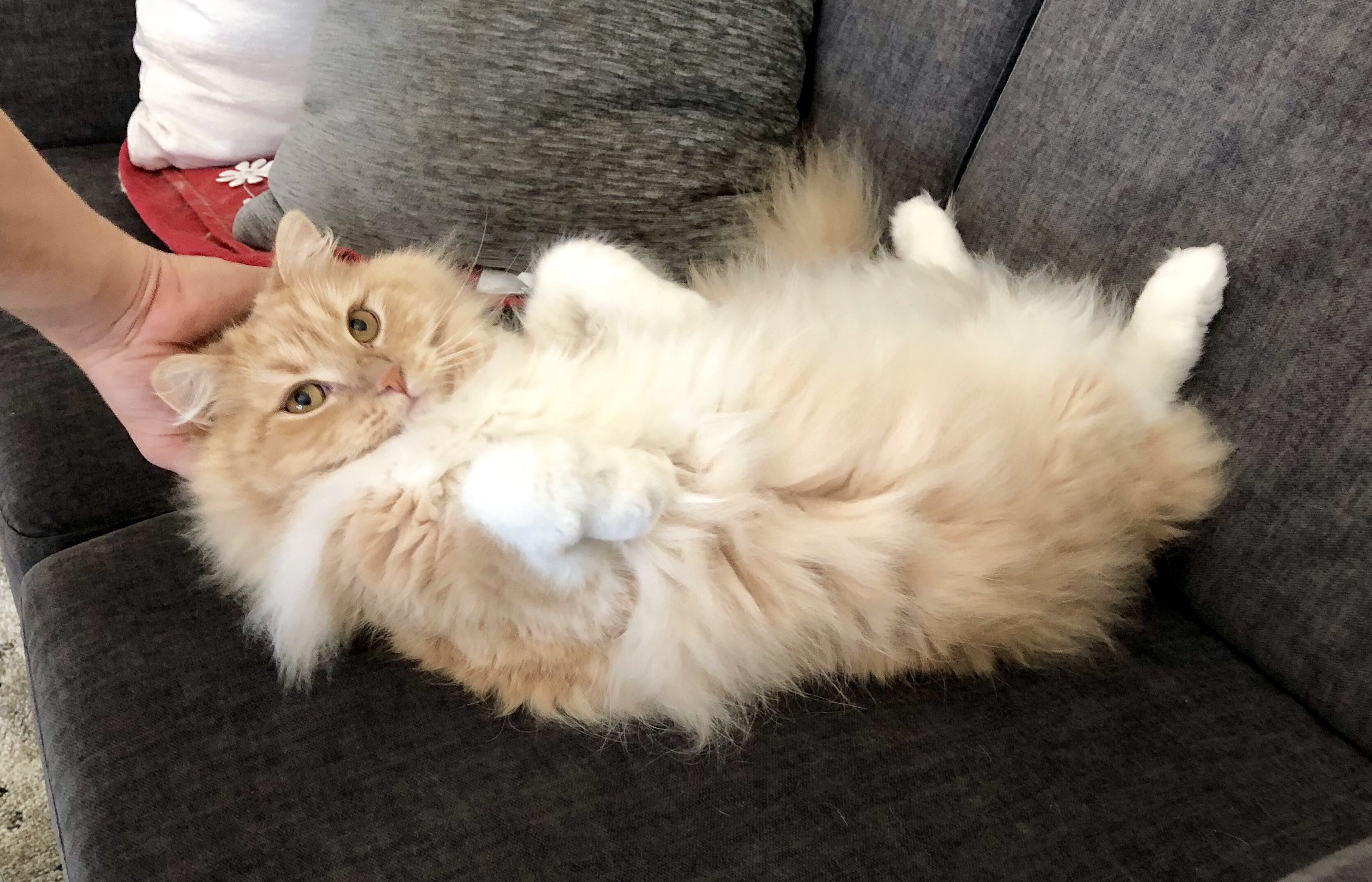
Kinglsey eager for his 15 seconds of fame
Chris Snider: My podcast is notorious for pet interruptions, either my own or my guests, and now that I have a puppy, it's a whole new ballgame as far as pet interaction for audio. We're all good here.
Lilly Stairs: Well, okay. Glad we're all on the same page, then. So many different pieces that we could dig into. One thing that I actually wanted to start with which is something that happened to you very recently because I was poking around on your Twitter this morning, and I saw a Tweet from you about prior authorizations and frustrations with insurance, and it read, "Guess whose medical supply company is suddenly out-of-network without any prior notice from their insurance company? Welcome back prior authorization. I've missed you." Tell me a little bit about this because, oh my God, I hear this day in and day out. I experience it. What's happening to you and what are your thoughts?
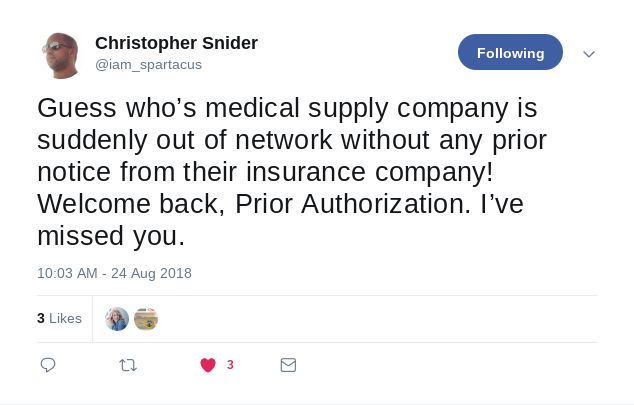
Chris Snider: Broadly speaking, people with diabetes have a number of options to manage their disease. In particular, for me, I wear an insulin pump that is connected to me 24/7, except for when I'm taking a shower or something like that. I wear a continuous glucose monitor that reads interstitial fluid which is a very close equivalent of my blood sugar. That gives me a new reading every five minutes. Those two pieces of technology, along with my blood glucose meter ... that's the traditional finger-poke thing ... that's how I do what I do.
Chris Snider: My wife also has Type One Diabetes. She also has the exact same stuff as me, which is kinda cool. So in case I run out of any of my supplies, I know where my backups are. They're literally in the drawer beneath mine 'cause we have a diabetes drawer in our bedroom. It's a whole thing. We have two of everything now. That's the easy part which isn't really that easy because diabetes is complicated.
Chris Snider: All this stuff, as you can imagine, requires insurance and getting all that stuff approved is a whole ordeal. You have to verify with your insurance company that you still have diabetes, a number of times. For the most part, I accept that the people that I talk with when I call the insurance company or whatever. They have a job to do. They have requirements. Especially working at Tidepool, I understand a lot more and appreciate a lot more. The Federal requirements for doing things a certain way ... doesn't make it okay. Doesn't make it fun, but I understand. I can play with the system.
Chris Snider: I'm authorized to make calls to insurance on behalf of my wife because she works at a place where she doesn't have regular access to her cell phone. So I can make calls and I can do all that stuff. So I have a pretty system. I have a Note Doc open with her insurance policy name, group number, all the crap that we need to verify our identities and get processes through. So I understand the system. I can work within it. What I don't like is when changes happen without my notification, and especially in the age of email or even snail mail. These people know where I am because they're getting my money. They should be able to tell me whenever my process is going to change.
Chris Snider: The supplier that I had to switch to is one that I used before I was working at Tidepool, so it was on a previous insurance. So I still have the online account which is Polaris. This story has a happy ending. I'm okay, but the part where I'm not notified about changes to my care until I actually have to do something ... and then, all of a sudden, "Oh, no. Wait." Your whole system has changed. If I were actually out of insulin pump supplies and I found out that my supplier changed, I would be pressing ... I wouldn't actually be on this podcast 'cause I'd be calling everybody every six hours to figure out what's going on because I have to worry about that stuff.
So, I'm in a good place right now, but the overall system it set up is just so aggravating because there's no inclusion but the patient perspective for that stuff. It's unacceptable for me, quite frankly.
Lilly Stairs: You know, I've seen so many biotech and pharma companies and digital health companies bring in the patient perspective and begin to listen to it. Some, I think, listen to it more than others, but, I have not seen insurance companies doing that. I don't see them bringing in the patient perspective, and I feel like there would be ... I know there would be a lot of benefit from that. I think that's a small step in the right direction, but I think we've got some major overhauls we're gonna need done, and that could be five podcasts or 500 podcasts that we could go on and talk about that.
Chris Snider: It's curious because when you think about how insurance is labeled as the bogeyman and as this evil empire sitting atop of the mountain ... you know like Dr. Evil or whatever ... Even if they wanted to engage in that, do you think the people would take them seriously?
Chris Snider: I've seen what's happen to Eli Lilly in particular, with regards to insulin pricing, and they're trying to do better given a lot of weird things and a lot of setup that isn't necessarily their fault, but they are capitalizing on it because they are a publicly-traded company and they have to make a profit, and it's gross and insulin pricing is horrible. They are trying to make efforts to do better within whatever restrictions they deem that they have.
Chris Snider: Even then, whenever they do roll out programs for affordability and things like that, I see a lot of resistance within the diabetes community, talking about that because it's not perfect ... because it's not gonna answer all the questions. They shouldn't get a pat on the back for that half-step, but they should at least get recognition that they are trying and I find that people are unable to even acknowledge that their perspective is finally being considered even if it isn't near where we wanna be, but the fact that they are making an attempt should at least be acknowledged. I'm not saying applaud it, but acknowledge, and I feel like there's a lot of challenge in the diabetes community.
Lilly Stairs: No, I couldn't agree more and I really appreciate this perspective that you're bringing to the podcast because I think it's great that we have conversations about this. First of all, I think it's good to talk about and expose people to this understanding that there are these little frustrations that we're constantly dealing with with as patients with the system, but then acknowledging the people who are trying. So I applaud you for your positive outlook on that.
Chris Snider: That's my best attempt at it, though, because it's so easy to get frustrated at so many different things ... with the system, with diabetes, with life. Last week, for whatever reason, recycling didn't get picked up in our neighborhood. You can hop on Twitter and find a million reasons to be angry, so maybe it's because I worked in the food service industry for two years, there's a certain level of empathy that I've developed that ... it doesn't change how I feel about it, but it's gonna change in the moment how I'm gonna treat that person that I'm on the phone with because I know they have a job to do and they often get a very thankless job.
Lilly Stairs: Empathy ... So you brought that up prior to us starting this podcast and now, as we're talking, I feel like like you are a pretty empathetic person. Correct me if I'm wrong.
Chris Snider: Thank you. I'm gonna go with, "Thank you."
Lilly Stairs: Okay. So can you tell me a little bit about your experience being married to another diabetes patient and the role that empathy has played in that relationship?
Chris Snider: Certainly. We met because of diabetes which was pretty cool. You know, we got married and we had cupcakes at our wedding 'cause we met at a cupcake shop. So, generally speaking, it's all kinds of adorable and gross. I'm sorry, internet audience listening to this podcast.
Chris Snider: As far as empathy is concerned, I know exactly what she's going through which is a blessing and a curse. When she has a low blood sugar, the best I can do is get her a juice box and wait 15 minutes to see if her blood sugar is coming back up. Because I know exactly what that feels like, it's the worse thing in the world. If I could take twice the diabetes so she'd have to deal with that, I would, but I can't.
Chris Snider: So you just have to do your part and, when necessary, help out and then also know when to step away and say, "You know what? You are a grown woman. You can handle this on your own. I'm right here beside you when you need my help but, again, you're a grown woman. I'm not gonna tell you how to manage your diabetes." So there's a weird unwritten rule where we don't talk about our insulin pump settings. We don't talk about, unless it's actually broached, we don't really talk about that stuff, and it's not quite necessarily, "Happy wife, happy life," but she has a way of doing things and her A1C is great. Her time-in-range is great for people who that care about that stuff.
Chris Snider: There all these little tweaks that you can make to diabetes management that I might have a perspective on because I'm not living her diabetes, but I know that she probably has the exact thoughts about my diabetes. So I feel like it's probably better left unsaid just so we maintain our sanity together as spouses.
Lilly Stairs: Yeah. That makes a lot of sense. So, do you feel like it's been ... I know you said it's been a blessing and a curse, but do you feel like it's been a benefit to have somebody who understands what it's like to live with a chronic illness?
Chris Snider: Oh, yeah, totally. There's so much that goes unsaid with our diabetes lives that can, sort of, be inferred. I could certainly teach that to somebody who doesn't have diabetes. It just would take a little bit longer like if you're out there trying to find the right partner in life, if they are a good person then they want to learn all about a you. They wanna try and complement you as best as they can. Part of that would be understanding what your patient experience is like. The learning curve is a lot shorter because I already have diabetes. So it, sort of, speeds up that process to getting to the good parts, I guess.
Lilly Stairs: Very cool, very cool. Shifting gears a little bit ... I'd love to hear more about your work at Tidepool, what Tidepool is, for starters and then what you're doing there and why you're jazzed about it and all that it's doing for the diabetes community.
Chris Snider: Sure. Tidepool is a nonprofit organization. We make free software to view the data from insulin pumps, continuous glucose monitors, and blood glucose meters ... all the stuff that I mentioned earlier. All of those devices, they generate a lot of data. Our software that we create visualizes that data, provides access to patients to their data because, at Tidepool, we believe patients own their data. We do this for free. The software is free for people with diabetes and clinicians. There is a clinical study research component, and that's where we charge money, and that money that we bring in keeps us sustainable as a nonprofit organization, but the easy part is that it's free software to see all those data in one place.
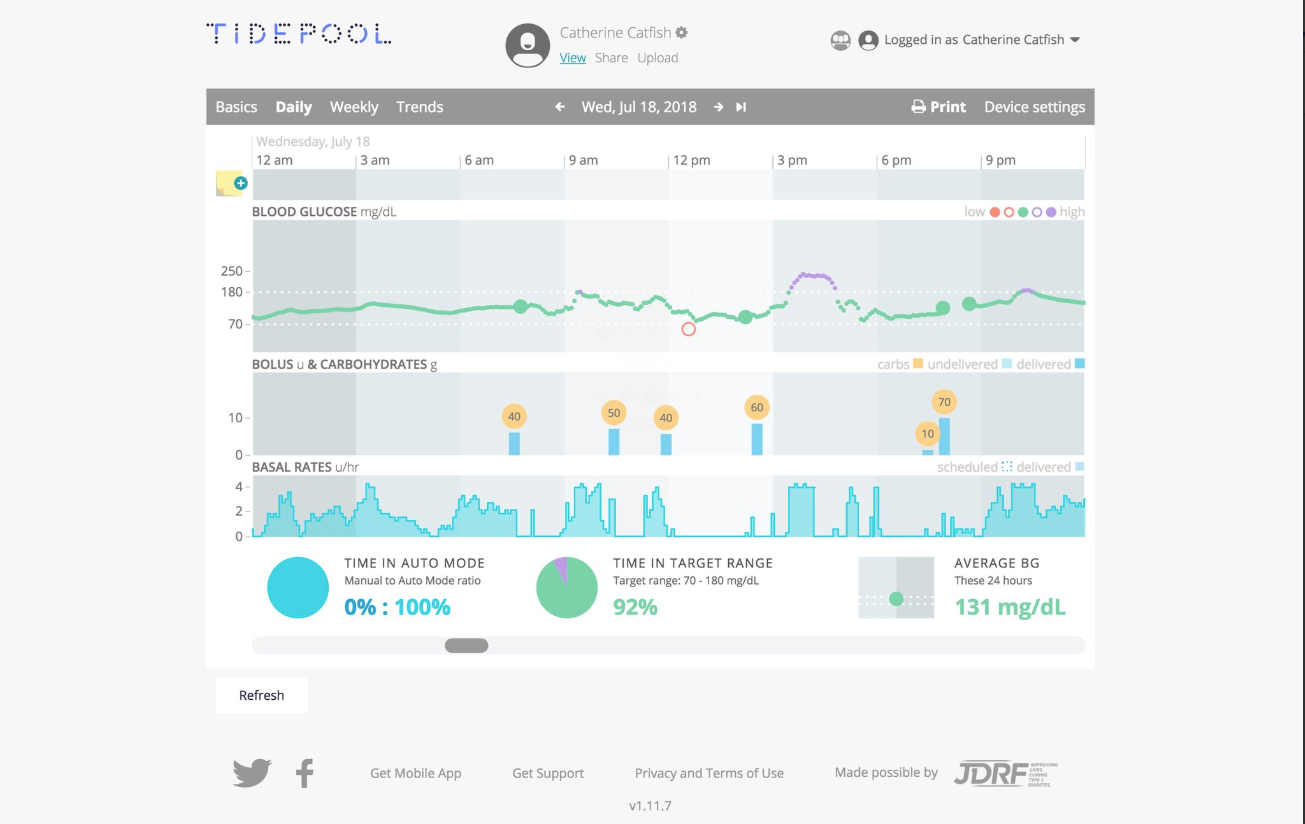
Chris Snider: The thing that's interesting about diabetes devices is that all these manufacturers have proprietary software to view the data on just that device. So my insulin pump has its own software. My CGM has its own software, but how those things are interacting ... how the different pieces and components of my diabetes are interacting together ... Prior to Tidepool, there was only one sort of solution that was viable out there, but it was also a paid solution, and our CEO, Howard Look, sought to be the change he wanted to see in the world and created a nonprofit that creates its own fun adventures in being sustainable and finding revenue and grant applications and things like that. Many nonprofit folks would understand that grind.
Chris Snider: It's a really incredible thing to be part of because, as mentioned, I have diabetes. My wife has diabetes. Everyone at Tidepool ... almost everyone ... either has a kid with diabetes or has diabetes themselves. So it's a very personal mission for us to deliver the software to the diabetes community. We understand what's at stake. We respect the challenges of getting it right, but also the incredible opportunity that is at our fingertips by providing access to this data.
Chris Snider: One last thing on Tidepoool is that we also enable people with diabetes to use our software to opt in to donate their data. As I mentioned, people with diabetes own their data. They get to choose to do this. If they choose to do it, we anonymize it, de-identify it, and license those datasets out to industry partners, innovators ... whoever needs access to big data. So when you hear things like "machine learning," that's where this can come into play.
Chris Snider: That revenue we bring in from there is also what keeps us operating, but that's just one example of what we're able to do.
Once we provide the access to the data and understand that ... check this out ... patients have power to contribute to more meaningful research and innovation. Understanding that it's their data, they can contribute to it if they so choose.
Lilly Stairs: I love that. Nice plug. Nice little cross-plug-
Chris Snider: I was thinking about that one earlier before I hopped on. I was like, "I could tie in the patient access data thing to the podcast title," 'cause it's a great podcast title. I just had to make sure I could figure how to make it work.
Lilly Stairs: Really, I mean, what you guys are doing is incredible, and I want you to take this model then scale to our whole healthcare system because ... Can you imagine? It's like now you have all these devices and the data talking to each other. Why can't we do that with everything in healthcare?
Chris Snider: I mean, yeah. People have Apple Watches that are collecting steps and heart rate data, why can't we visualize that on the Tidepool platform? People have heart rate monitors. People have implantable devices that are measuring things like that. Why can't we spin off the Tidepool platform and make something like that happen? The answer is, "Well hey, our software is open source. Go ahead and do it yourself," which is, kind of, tongue-in-cheek but also true. Our software is opensource. If people wanted to spin off our data visualization platform and build something else to visualize other data, it's certainly possible. I'm not an engineer. I'm the Community Manager at Tidepool. So I have the easy job of bragging about the work that our engineers do. They say, "Chris, this is done. Go tell the world." I whip up a couple of emails and some Tweets and Facebook posts, and it's, kind of, that easy, but also not but-
Lilly Stairs: You and I both ... we'll bring in some engineers next time so that they can break everything down for us and tell us what's happening behind the scenes.
Chris Snider: Oh yeah. Whenever you're a part of those team calls, isn't it fascinating ... like, your own onboarding and understanding of what actually is happening behind the scenes? I took computer science classes in high school. So I have a vague idea of what an "if-then" statement is, but what these people are doing is so incredible and my ability to understand that, it increases a little bit every day, but as I get a better understanding of what actually happens in GitHub 'cause GitHub is a scary place to me.
Chris Snider: I start to ask more questions because I'm more informed, and it's a really exciting informal measurement of my own growth as a contributing member to the team 'cause I know it's not just about ... The engineering work is not just about telling the world, "There's a collaboration across marketing and engineering and all these different groups regardless of the company you're working for," but being able to measure that in my own understanding of the work that's being done ... in part 'cause I have to understand it 'cause I'm talking about it all the time, but it's really cool to be like, "Oh, no no. This is what they were talking about a month ago and here's the fix for for and here's why it's important, and here's the but ..." All these dots get connected in my brain, and it's like in, "A Beautiful Mind," where you have all the conspiracy theories and the strings and all that crazy stuff is happening in my brain for Tidepool stuff, specifically, and it's really exciting.
Lilly Stairs: Yes. I feel like you were even just ten steps ahead of me on all the engineering piece. I've also ... I learn a little bit more every day, but you need communicators. You need engineers. You need everybody to make it work. So, how can diabetes patients sign up for Tidepool if they're interested in getting involved?
Chris Snider: Tidepool.org/signup is the place to create your free account. Then there's a walk-through and then onboarding process to install our software to Tidepool Uploader and get everything going there. That's, sort of, the easy part. The, from there, uploading the data is one thing. Interacting with it, understanding it, trying to figure out where to identify opportunities for meaningful change, whenever you consult your doctor 'cause I'm not a doctor, that's the next level of it.
Chris Snider: Even for me, I've been using Tidepool for about two and a half years. I was a fan before they paid me to be a fan. I only upload my data once a month. I don't look at my data all the time, but I know that it's in a place that I have access to whenever I'm ready to make a change. You have to be in the right mindset for something like that because there are so many numbers at play. Even as I'm talking with you right now, I'm thinking about what I ate before we had this call, what I drank before we had this call, what my blood sugar is going to be, whether I should be bolusing right now.
Chris Snider: There are always other mental calculations taking place with diabetes care. There are tools and technology to reduce some of that mental burden, but diabetes is a never-ending adventure. That's speaking positively about it. So having that data access component to it is important but, again, you have to be int he right mindset to want to interact with all that stuff because you can easily get overwhelmed and get burnt out on it, and they definitely don't want that.
Lilly Stairs: Right. Well, okay. This is great to know. I'm so glad that we've been able to chat about this tool and resource for patients ... also, I mean for furthering research in industry. Ultimately, that's another thing that you guys are giving back to that's really phenomenal. I wanted to wrap up. I have two more questions for you ... one of them being, "As somebody who's lived with Type One Diabetes for quite a while now, what would be your top tip or tips for those who are newly-diagnosed or they're struggling with dealing with the diagnosis.
Chris Snider: All right. I'm not a doctor. You should find other peers living with this disease. If you're a parent, find other parents that are dealing with this or that have already dealt with it. If you're a person with diabetes that has regular internet access and you don't mind Twitter, go to Twitter and find the diabetes community there. Independent of the technology ... 'cause the technology's been an incredible improvement on my diabetes care and how I feel about myself in general ... but finding a community of people who truly get it, that is the thing that has actually meant the most to my diabetes life.
Chris Snider: Again, it's how I found my now wife. It's how I actually got on a Dexcom ... is because I read a patient blog about it. It's how I felt confident about my choice about an insulin pump ... because I read blogs from people who I trust and I could talk with these other people who have become, now, my friends. Finding that community is the thing that matters to me in my diabetes life.
Chris Snider: Again, I'm pretty sure you can replace the noun there for any other chronic disease and know that when you have a community out there who gets it, you don't have to worry about trying to explain things. You can just say, you know, for me, "I feel high," and people know that I'm not talking about medical marijuana. They know that my blood sugar is skyrocketing and I'm feeling really sluggish. There's an inherent jargon that you don't have to explain to this community, and they get it. They're not gonna say, "I'm sorry. How can I help?" They're just gonna say, "That sucks," and you know it's coming from a place, again, of empathy 'cause they deal with that stuff too. Finding that camaraderie is the thing that I recommend most to people.
Lilly Stairs: That is a great tip. Love it. Okay, and then finally, because everybody are our podcast, what does patients have power mean to you?
Chris Snider: Hmm. I didn't think about this one. I thought about tying in data access. I'll lead with the data access. That's fine.
I think power is relative to your own patient experience within the diabetes community. It's knowing that it's your data. You should have access to it. You are in control of it. From there, you get to determine what sort of impact it'll have. Does it contribute to research? Are you contributing to whatever? Are you participating in any clinical studies? Are you just concerned about having access to it yourself so that you can make change and you wanna share it with your doctor. Understanding that it's your data and you are the one in control, you hae the power ... that's the big thing for me. Yeah.
Lilly Stairs: That's perfection.
Chris Snider: Yeah, okay. Good.
Lilly Stairs: That's a great answer, and if it ties back to Tidepool, ties back to Clara ... your journey, I think, it's ... that answer is you. That answer is you, Chris.
Chris Snider: Awesome.
Lilly Stairs: Chris, thank you so much for joining us today. This has been so insightful.
Chris Snider: Thank you for having me. Clearly I love podcasting. It's not a problem, but it's a rare opportunity for me to be the person to answer the questions and know that I've been rambling on for too long and that I need to give me host an opportunity to ask another question. So thank you for giving me that chance.
Lilly Stairs: Yay. Well you've done a phenomenal job. I'm glad that we're able ... you tell so many stories. I'm glad that we're able to tell your story.
Lilly Stairs: You can check out Chris, learn more about him at christopherasnider.com. You can also find him on Twitter @iam_spartacus. We will post the show notes from this and we will share it far and wide on social media. Thank you for all that you do for the community, Chris. It's an honor to have the opportunity to collaborate with you.
Chris Snider: Thanks for having me on, Lilly Stairs ... really appreciate it.

